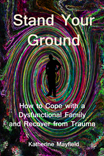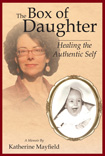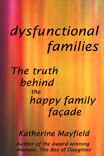
|
Many people put up with abusive behavior without really knowing it's abusive. We see bullying in the workplace, or in our family, or see it on a TV show, and think maybe everyone does this. It seems normal if you saw it happening in your family when you were a child. But bullying is not normal, and learning to perceive emotional abuse and bullying is the first step in healing from the pain of being abused and bullied. Emotional abuse is any behavior designed to control and subjugate another person by using fear, humiliation, and repeated verbal assaults. It can include constant criticism, intimidation, belittling, berating, and refusal to ever be pleased. Emotional abuse happens often in toxic families, and even in the workplace. Emotional abuse is similar to brainwashing in that it steadily wears down the victim’s self-confidence, sense of self-worth, trust in their own perceptions, and self-esteem. Sometimes the abuse is disguised as “guidance,” “teaching,” or “advice,” but the results are the same. The recipient of the abuse eventually loses all sense of self, and stops believing in his (or her) personal value. Verbal abuse can take the form of blaming, ordering, threatening, and name-calling. Emotional abusers may also invalidate the perceptions of the victim by denying reality when the victim confronts the abuser, saying “I never did that” or “I never said that,” or by telling the victim she doesn’t know what she’s talking about. People who abuse and bully will not accept responsibility for their actions. Abusers may also refuse to listen, refuse to communicate, or withhold attention from the victim, in essence giving him “the silent treatment.” Withholding any kind of praise, encouragement, or support is also common. In some cases, emotional abuse can cause severe physical problems as the body attempts to reveal the effects of the abuse in a desperate plea for help. Find out how emotional abuse can affect your physical health by reading my story below. What is Bullying?
Bullying is essentially the same as emotional abuse, though it can include physical assaults as well. The bully uses force or coercion to affect others, usually in the form of intimidation (“If you don’t do things my way, I won’t be happy, and you’ll be in big trouble”). People who bully use their power to control or harm others, and people being bullied often have difficulty finding a way to defend themselves because of the bully’s irrational tactics (also known as "bully games"). Check your reaction to the person. Do you feel supported, or do you feel small and “less-than”? Are you fearful of them? These are signs that you’re being bullied. Anyone can be a bully: a parent, a spouse, a friend, a child, a teacher, a minister. Just because someone is in a position of authority doesn’t mean they are immune to bullying. Some people who hold powerful positions use their power to intimidate others. Children who bully others at school have often learned bullying at home from their parents or siblings, either by seeing someone else bullied, or being bullied themselves. The same situation occurs in workplace bullying: at some point, the bully learned that he or she could only get what was desired by bullying others. Coping with Feelings As you begin to heal the pain of being abused, you must acknowledge and express your feelings. If we don’t admit our feelings to ourselves, we repress them, and their roots grow even deeper into the psyche. Over time, repressed feelings can cause cancer, heart disease, ulcers, back pain, and a host of other physical ailments. Though the feelings are very painful, looking at them and expressing them will help release them so the pain will eventually diminish. This is the only way to heal completely from an abusive past and develop solid self-esteem. Crying, punching sofa pillows, or working anger out with exercise are very healthy ways of releasing difficult emotions. Try to keep a part of yourself aside as an "empathic witness" while you release the feelings, and let that part of you take care of your hurt self as you would take care of a child. You can comfort yourself as well as or even better than another person can. If you listen to your body, it will tell you how it wants to let go of the feelings, and it will become much healthier as you let go of the stress hormones that have built up in your system as a result of the abuse. Emotional Abuse: My Story During the last eight months of my father’s life, I lost weight at an alarming rate. At 5’5” and 120 pounds, I didn’t have any extra to lose, but the pounds kept dropping off in spite of eating several good-sized, healthy meals every day. I went to a doctor, to specialists, had tests and CAT scans, and no abnormality was found. But I knew exactly what was happening. I was suffering from the effects of five decades of emotional abuse. My body was telling me that I was literally disappearing. By the time my father passed away, I had lost almost 20 pounds, and I could barely stand up.After my father died, I regained the weight and my health within three months. Soon after, I read Martha Beck’s wonderful book Steering by Starlight, and I came across her definition of “Spider Love”: a love that’s consumptive, not giving. Suddenly, it all made sense. All of the bullying and belittling, the criticizing and complaining, had drained me until I was holding on to life by a slender thread. After suffering depression and anxiety for most of my life as a result of the abuse, when my father died I began a journey of healing from the trauma, building my self-esteem and creating a much more fulfilling life, a process which I wrote about in The Box of Daughter I encourage you to begin your own journey of healing. Sometimes it’s painful to face the past, but it’s the only way to create a more fulfilling life. Reading Alice Miller’s The Drama of the Gifted Child: The Search for the True Self is a good way to start. I wish you peace and comfort along the way. —Katherine Mayfield |
Buy The Box of Daughter Buy on Indiebound, pick up
Recommended read: Read my article on coping with family bullies on |




